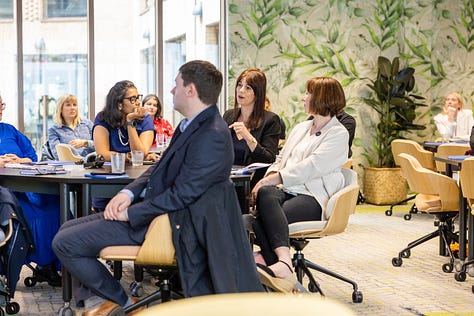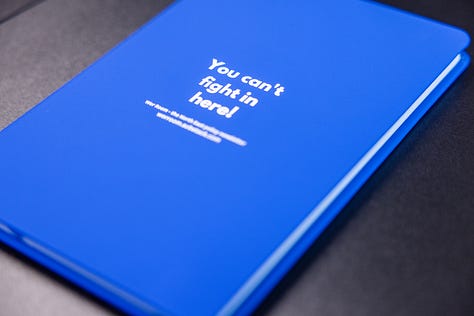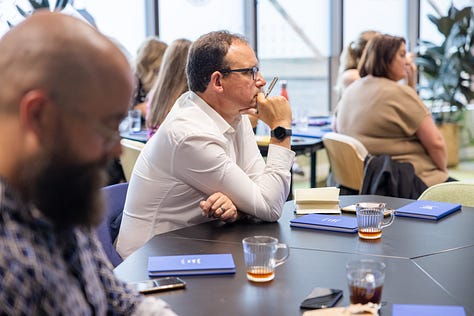"Look forward to what we could be, not just what we were"
More on the North East narrative, plus health inequalities data
I’m still fielding responses to last week’s Wor Room event, thank you to everyone who has reached out - there’ll definitely be a follow-up event to come later in the year, and you lovely newsletter subscribers will be the first to hear about it.
For anyone who couldn’t make it, I’ve written it up in a bit more detail on my website here.
It includes some of the insight I mentioned in last week’s newsletter, as well as some more of the audience submissions around what the North East means and what should be in a narrative for the region.
You can also watch my immediate reaction below.
It was really heartening to see a huge amount of positivity in the responses to the questions I asked during the event - lots of mentions of the North East being home, being ambitious, innovative, welcoming.
But there was also a recognition of the problems the region faces, and a desire to set some things right.
“A huge region with brilliant natural, physical and people resources - but also unacceptably high levels of inequality, poverty and deprivation.”
Attendee response to the question ‘What does the North East mean to you?’



Lots of the same notes echoed through both of the freeform response sections of the event - especially around ambition, work ethic, and the region’s industrial heritage being a foundation to build on.
‘Soft power’ came out as important too - sport, culture, tourism and hospitality are all seen as vital parts of the region’s offer.
“Linking the disadvantaged to the opportunities which would make a difference to their situation and future prospects.”
Attendee response to the question ‘What should be in a North East narrative?’
I mentioned last week the range of audiences that we need to consider when presenting the region to the world - and the importance of reaching a variety of internal audiences too.
That was one of the points which came across most strongly in the panel discussion, the Q&A, and the audience responses - as the quote above says, we need to be making a connection between the opportunities the region offers with those whose lives could be changed by them.
Life expectancy is falling in Co Durham
There was a national report out this week from The Health Foundation sounding the warning about longer life expectancy and therefore the increasing period of our lives (on average) that the people of the UK will be spending living with a chronic health condition.
That’s a policy problem - you’ve got to build health provision around that, you’ve got to build housing, social care, even employment support, around that…and have it change massively over the next couple of decades.
Delightfully (*not really) though, there’s a different problem in parts of the North East.
Here, life expectancy is falling, and ill-health is a very real problem now, not one for 15 or 20 years’ time.
New research from the County Durham Community Foundation and Health Equity North - which you can read here - highlights some pretty devastating trends.
Here are some of the lowlights:
Male life expectancy fell by six months across Co. Durham in just three years between 2015-17 and 2018-20 (female life expectancy in Darlington fell by a year over this period!)
Average life expectancy is 77.7 years in the Tees Valley, that’s more than two years below the English average of 79.8 years
There is a ten year life expectancy gap between the most and the least deprived parts of Co Durham and the Tees Valley
Deaths from drug misuse are double the English average (11.7 per 100,000 compared to 5.0 per 100,000 nationally)
Emergency admissions for Under 5s in County Durham are 35.6% higher than the national average (it’s 74.4% higher in Darlington)
The full report looks at health divides, wellbeing divides, employment issues and the lingering impact of the pandemic - it also estimates that if Co Durham and the Tees Valley were brought up to national averages on these measures it would be worth £4bn extra to the region’s economy.
It’s another one of those graphs with gaps which needs to be closed, but given the subject, if anything they under-play the real life impacts.
How the rest see us…
I was struck by this piece in the Guardian this week, which gave a take on the North of Tyne's newly independent mayor, the emerging North East mayor's race, and what it means for Labour and their General Election prospects.
Now, I'm going to studiously avoid two things while talking about this - the first is the rights and wrongs of Jamie Driscoll's exclusion from Labour’s list of candidates, I simply don't know enough about it to cast judgment. No one outside the inner workings does.
The second thing I'm avoiding is any criticism of Helen Pidd, who as one of the very few Northern-focused journalists at a national paper is doing a huge public service, and she's very good at it.
Okay, so, the piece caught my eye because I think it's illustrative of how the North East is likely to be depicted over the next year.
Driscoll's break from Labour is perfect for the Westminster soap opera - does Starmer have control of his party? Is The Left splintered? Will in-fighting derail Labour's chances?
It is dramatic, and it allows the creation of more drama - that's something you can use to tell stories.
Just as with Brexit, the North East will be a Petri dish for political journalists to examine with their microscopes - is Joe Bloggs the Working Man from Ashington interested in Starmer? Will Labour rebuild the ‘Red Wall’? What do the people of Sunderland think about X,Y,Z wedge issue?
Local circumstance, local knowledge and, well, the truth, will get lost when there's a pre-conceived story to tell.
I remember in the aftermath of the Brexit vote the Chamber of Commerce fielding calls from the Wall Street Journal and the New York Times.
I even sat for an hour with a Japanese newspaper, who had dispatched two correspondents to the North East to discover what it meant for Nissan - being good journalists they'd done what you're meant to do to find out what's going on and gone to the nearest pub to Nissan's site to speak to real people. Their English was good, but it wasn't Washington-pub-on-a-Tuesday-afternoon good, so I don't think it was a particularly informative visit. But they felt they needed to come to the North East because it was the Brexit-place…they are least had Nissan as an excuse, unlike the others.
The narrative that the North East was the frontline of the battle, and somehow a distilled, simpler version of it, had been established.
The same will happen with the debate around Labour's prospects - as the mayoral campaign hots up, it will come to be seen as a distilled, simpler version of the General Election campaign. Not Labour vs Tories, but Labour vs itself, and versus public enthusiasm.
So, when Driscoll says he's had vocal support from Conservatives, I don't doubt it - but it's not because they think he's brilliant and want him to win, it's because they think they've found a new, distracting Petri dish.
The Guardian piece is the model we'll see again and again, only the quality of reporting and degree of local understanding that's in Pidd’s piece won't always be present - so, be prepared to challenge it when it starts to come in waves.
What else I've been reading this week
This blog on policy impact in higher education from Jen Harrison, one of my freelance colleagues here in the region. I've worked with Jen delivering workshops for academics on policy engagement, and she's taken a look at the changing framework around research impact
This Substack from another freelance colleague (although based in the North West),
- Alex has just relaunched his policy and data science Substack, where in the latest installment he sees what he can glean about policy direction from Civil Service job postings
What’s coming up in the next week or so?
Parliament is in recess, so not much happening there
Data on ill health and reasons for economic inactivity out today…not sure if there'll be any regional breakdowns in it, but it'll be informative nonetheless
House purchase affordability data out tomorrow
Some experimental stuff on UK interregional trade out on Friday
There are quite a few Commons and Lords Committee inquiries which are open for evidence over the summer - if I get a chance I'll do a quick rundown for next week's newsletter
Working with me
I’m available for freelance policy-related commissions - let's chat now or over the summer if you'd like me to help out on anything in September.
I do things like:
translate your big research or academic paper into a useful policy briefing
help you take your big pile of data and tell stories with it
interview people and turn it into really nice written content
You can find out more about me on my website.
You can email me on worroom@substack.com or arlen@arlenpettitt.co.uk
I’m @arlenpettitt on Twitter, and you’ll find me on LinkedIn.





